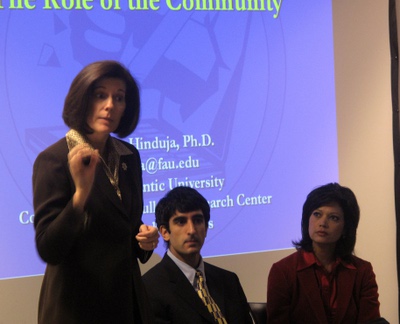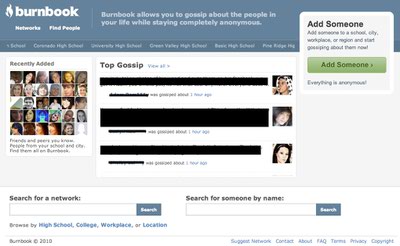Friday, Nov. 12, 2010 | 2 a.m.

Sun archives
Sun archives
- Experts warn of pitfalls teens face on social networking sites (11-11-2010)
- Anonymous Burnbook.com posts rattle Henderson high schoolers (11-3-2010)
- Rutgers student’s suicide prompts Las Vegas anti-bullying rally (10-5-2010)
- Police, school officials take on cyberbullying (9-8-2010)
- Teens learn consequences of sexting, cyberbullying for Law Day (4-30-2010)
- New technologies create new legal issues (4-29-2010)
My wife called me this week. “Have you heard of this website, Burnbook?” she asked.
I hadn’t, but I should have — it had caused a ruckus recently at Green Valley High School, where, according to news accounts, several students were suspended for posting to it.
Essentially Burnbook is — or was; it’s been down for several days now — a social networking site where students anonymously comment about one another. You can filter the comments by high school and drill down to what’s being said about people you know.
I dialed it up, narrowing the results to the local high school my son attends.
Ugh. Along with low-rent teen cattiness and name-calling you expect (apparently, the word “slut” never goes out of style), there were several posts that … well, let’s just say we can’t pass along the darndest things kids say these days. Far as I could tell, none mentioned my son. Whew.
A site such as Burnbook draws extra concern and attention in light of the burgeoning phenomenon of cyberbullying, which is the use of e-mail, social media and texting to harass someone. The site was mentioned in news accounts of Wednesday’s cyberbullying forum at the Paseo Verde Library, featuring Attorney General Catherine Cortez Masto and Sameer Hinduja of the Cyberbullying Research Center.
Even after looking at Burnbook, it’s hard to know what level of anxiety to bring to it. On the one hand, there have been some recent incidents nationwide, including the young Rutgers University student who killed himself after his roommate streamed live video of his intimate encounter with another man. As always when kids are involved, it’s tempting to err on the side of excessive alarmism.
At the same time, some of the comments, while absolutely rank and offensive, also sounded a lot like kids taking the rare chance to misbehave without consequences. I wouldn’t say it’s harmless, but I wonder exactly what level of hand-wringing is called for. Is cyberbullying getting a higher ride in the media because of the hot nowness of social media technologies?
Indeed, Slate.com, which has done a lot of reporting on this subject, has cited a 2009 study by Hinduja’s center that shows although 29 percent of respondents had been cyberbullied, 44 percent said they had suffered the good old physical kind.
One thing I find interesting about virtual bullying is the way it flattens the power inequalities of the physical world. Who, I asked Hinduja before Wednesday’s event, does the cyberbullying? His answer: “Anyone who wants to do it.” Thanks to the anonymity and identity games the Web makes possible, you needn’t be a socially connected mean girl or freakishly large boy to dole out the pain. Now a pipsqueak with a nasty streak and a Wi-Fi hot spot can do it, too.
I asked Hinduja, a professor at Florida Atlantic University, what could be done to curb the problem. He didn’t think it was a matter of clamping down technologically: “Kids will find a way to get around technological restrictions,” he said. (Anyway, there are free-speech issues, as Slate.com notes: “[T]he vacuum cleaner that would cleanse the Web of its pseudonymous nastiness would also suck up a lot of free speech. Freedom often doesn’t go with niceness.”)
Prevention, education, he answered; helping kids cultivate empathy.
I wish him luck with that approach; I’d like to believe we’re as easily led to empathy as we are open to cruelty, all evidence to the contrary. Alas, too often with human beings, there’s just something about a vulnerability revealed that makes us want to go for the jugular.
Or we can just wait and hope kids outgrow the urge to cyberbully. I mean, look at the comment threads under any online news story about a homeless person or domestic-abuse victim. Your heart will swell at all the, uh, human sympathy adults are capable of.



Join the Discussion:
Check this out for a full explanation of our conversion to the LiveFyre commenting system and instructions on how to sign up for an account.
Full comments policy